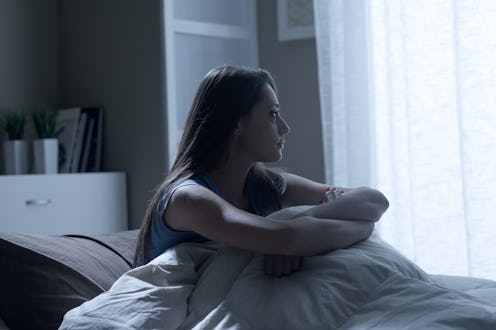Life
6 Hacks For Reversing Sleep Debt

Not getting enough sleep can wreak havoc on everything from your energy levels to your mood. If you haven't been getting enough sleep, you're likely feeling the consequences, which means it's important to catch up ASAP. Thankfully, there are a number of ways you can reverse sleep debt, but it requires a little bit of effort and planning to make sure you're getting adequate rest each night. There's no replacement for good sleep, but even if you've been lacking in the slumber department, there are ways to turn it around for the future.
Research suggests that for optimal health and functioning, the average adult should get seven to nine hours of sleep per night. However, many of us fall short of this goal, resulting in sleep debt. "Unless utilizing devices such as your cell phone or [fitness tracker], our body does a poor job of reminding us we need more sleep," behavioral psychologist and sleep expert Dr. Sara Nowakowski, tells Bustle. "In fact, as we accumulate sleep loss, our bodies will habituate to this loss and allow us to compensate for not enough sleep."
But this does not mean that we do not need the sleep. "As the sleep debt mounts —particularly for those that sleep less than 6 hours — the health consequences increase, putting us at growing risk for [...] diabetes, heart disease, stroke, memory loss, and depression," Dr. Nowakowski says.
To make sure you stay as healthy as possible, you'll want to put in the effort to get back enough sleep. Here are six hacks to help you reverse sleep debt, according to experts.
1Power Nap
A well-timed power nap can help rejuvenate both your body and your mind. "Napping for 20 minutes can increase the ability to pay attention," integrative doctor Eudene Harry, MD, tells Bustle. "It gives the body just enough time to relax, slow the heart rate, and slow the brain waves, therefore, creating a brief period of rejuvenation. You do not yet enter into deep sleep, so you wake up feeling refreshed instead of groggy."
2Track Your Hours
Work backwards to find the optimal bed time, and stick to it like it's an appointment in your calendar. "It is tempting to try to fit more into your day, but remind yourself sleep is important to your health," Dr. Nowakowski says. "Again, you can utilize your cell phone or activity monitor device [...] to remind you of bedtime and track if you met your bedtime goal in order to obtain a sufficient amount of sleep."
3Tack On An Extra Hour Each Night
Set up a plan to get back the sleep you have been missing. "You may have to tack on an extra hour each weekday and an additional two to three hours on the weekend," Dr. Harry says. "You will know you have made a dent in paying back your deficit when you start waking up feeling refreshed and energized."
Although this can be useful when you're extra low on sleep, try not to make sleeping in on weekends a consistent habit, as keeping a consistent wake time will help strengthen your body clock.
4Try A Supplement
If you're having trouble falling asleep at night, consider some natural remedies to help you doze off. "Certain supplements, like tryptophan, melatonin, valerian, or chamomile root may also help deepen sleep," psychiatrist and sleep doctor Alex Dimitriu, MD, tells Bustle. "Avoiding alcohol and large meals before you do sleep can help as well, as alcohol can often disrupt sleep and result in more light sleep rather than deep, restorative sleep."
5Create A Better Sleep Environment
Prepare yourself for sleep each night by changing up your nighttime habits and creating an optimal sleep environment. "A cool bedroom that is dark and quiet helps," Dr. Dimitriu says. "Minimizing electronics, screens, and phones before bed also helps us sleep deeper by allowing more melatonin to do it's work through the night."
6Drink A Little Coffee
When all else fails, you can turn to a cup of coffee for a temporary boost of energy. "The killer combo for sleep deprivation is a cup of coffee just before a short 20-30 minute nap," Dr. Dimitriu says. "You wake refreshed from the nap, just as the caffeine is kicking in, and this can help get you through the day. I often advise not doing this too late in the day, as both the nap and caffeine can disrupt night time sleep."
Just because you are a low on sleep doesn't mean you're stuck with the negative health effects. Utilize these tips to help get back on track and reverse your sleep debt.